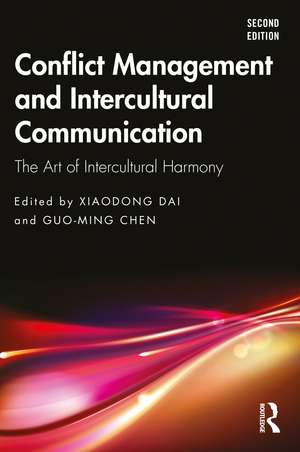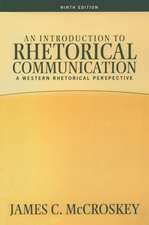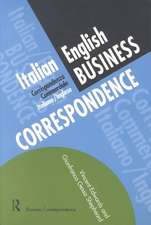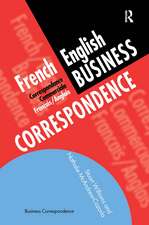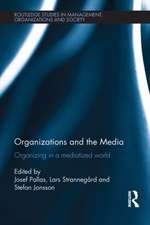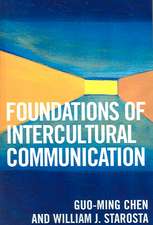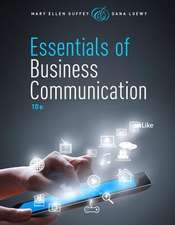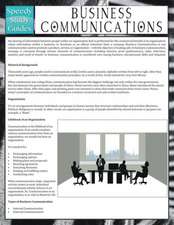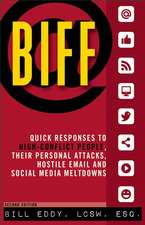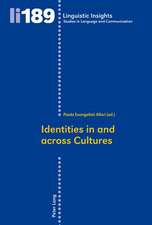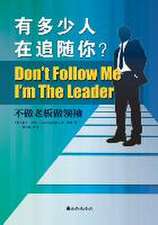Conflict Management and Intercultural Communication: The Art of Intercultural Harmony
Editat de Xiaodong Dai, Guo-Ming Chenen Limba Engleză Paperback – 15 noi 2022
The book begins with the theoretical perspectives on conflict management and harmony building. It examines intercultural communication ethics, diversity and inclusion, conflict resolution, conflict face negotiation, and intercultural competence. It presents both Western and non-Western perspectives. The book then addresses in its second section conflict management and harmony building in specific contexts. These include communication in intergenerational relationships, multinational corporations, and virtual spaces, and covers a range of national cultures including the USA, Japan, Germany, and China.
Drawing on the current research findings, this book covers the major theoretical perspectives and provides for a wide range of discussions on intercultural conflict management. It is a crucial reference for teachers, students, researchers, and practitioners alike.
| Toate formatele și edițiile | Preț | Express |
|---|---|---|
| Paperback (2) | 372.70 lei 6-8 săpt. | |
| Taylor & Francis – 15 noi 2022 | 372.70 lei 6-8 săpt. | |
| Routledge – 27 feb 2017 | 402.13 lei 6-8 săpt. | |
| Hardback (2) | 763.86 lei 6-8 săpt. | |
| Taylor & Francis – 15 noi 2022 | 763.86 lei 6-8 săpt. | |
| Routledge – 27 feb 2017 | 1039.99 lei 6-8 săpt. |
Preț: 372.70 lei
Preț vechi: 479.80 lei
-22% Nou
Puncte Express: 559
Preț estimativ în valută:
71.33€ • 74.35$ • 59.38£
71.33€ • 74.35$ • 59.38£
Carte tipărită la comandă
Livrare economică 04-18 ianuarie 25
Preluare comenzi: 021 569.72.76
Specificații
ISBN-13: 9781032181219
ISBN-10: 1032181214
Pagini: 366
Ilustrații: 14 Tables, black and white; 20 Line drawings, black and white; 20 Illustrations, black and white
Dimensiuni: 156 x 234 x 22 mm
Greutate: 0.7 kg
Ediția:2nd edition
Editura: Taylor & Francis
Colecția Routledge
Locul publicării:Oxford, United Kingdom
ISBN-10: 1032181214
Pagini: 366
Ilustrații: 14 Tables, black and white; 20 Line drawings, black and white; 20 Illustrations, black and white
Dimensiuni: 156 x 234 x 22 mm
Greutate: 0.7 kg
Ediția:2nd edition
Editura: Taylor & Francis
Colecția Routledge
Locul publicării:Oxford, United Kingdom
Public țintă
Postgraduate and UndergraduateCuprins
Section One: Perspectives on Intercultural Conflict Management and Harmony Building 1. Moving from Conflict to Harmony: The Role of Dialogue in Bridging Differences 2. A Dialogic Approach to Intercultural Conflict Management and Harmonious Relationships: Dialogue, Ethics and Culture 3. Constituting Intercultural Harmony by Design Thinking: Conflict Management in, for, and about Diversity and Inclusion Work 4. The Development of Interculturality and the Management of Intercultural Conflict 5. Transforming Conflict through Communication and Commonground 6. Conflict Face-Negotiation Theory: Tracking Its Evolutionary Journey 7. The Art and Discipline of Nonviolence: An Intercultural Praxis Approach to Conflict in the Neoliberal Global Context 8. Multicultural Identity and Conflict Communication Competence in the 21st Century 9. De-Westernizing the Conflict Management Model: Is "Avoidance" Really that Bad? 10. The Yin and Yang of Conflict Management and Resolution: A Chinese Perspective 11. A Chinese Model of Constructive Conflict Management 12. Intercultural Competence and Harmonious Intercultural Relations: Interdisciplinary Perspectives and Insights Section Two: Intercultural Conflict Management and Harmony Building in Contexts 13. The Discursive Construction of Identities and Conflict Management Strategies in Parent-Child Conflict Narratives Written by Chinese University Students 14. No Intergenerational Conflict: Older Adults’ Reports of Communication Characteristics in American Family and Nonfamily Intergenerational Relationships 15. Intercultural Communication Management Professionals in the Japanese Linguistic and Cultural Environment 16. Conflicts in an International Business Context: A Theoretical Analysis of Interpersonal (Pseudo) Conflicts 17. Intercultural Conflicts in Transnational Mergers and Acquisitions: The Case of a Failed Deal 18. Leveraging Differences: Perceived Complementarity as a Synergy Potential in Sino-German Cooperation 19. Intercultural Challenges in Multinational Corporations 20. Understanding Intercultural Conflict in the Virtual Space: Characteristics, Approaches, and Management Styles
Recenzii
‘There is hardly a more timely and important subject to study than conflict, its cultural conceptions and enactment. Given the complexity of the world’s stages today, there is hardly a more challenging arena in which to study conflict than through an intercultural and international lens. Here in Dai’s and Chen’s new edition, we have a wide range of studies that address these concerns. The international network of scholars spans a range of fields and nations and thus adds diversity in region to this type of study as well as a wide range in scholarly approaches. Readers will enjoy a breadth in views, finding conflict to be conceived, addressed, and managed in particular and multiple ways. Reading these works with an eye toward further inquiry and practice will no doubt serve as an aid to further knowledge and social betterment.’
Donal Carbaugh, Professor Emeritus, University of Massachusetts Amherst, USA
'This edited volume on intercultural conflict could not appear at a better time! Incorporating multidisciplinary approaches, perspectives, and contexts, the renown contributors suggest ways to explain and diffuse enduring conflicts, predict or prevent others from erupting, and how to address or handle tensions so that constructive interconnectivity can be realized. The book brilliantly includes both established and updated thinking, Eastern and Western approaches, theoretical and applied perspectives on complex conflict landscapes, and highlights future research directions on intercultural negotiation, mediation, and harmony. As the world grapples with complex tensions within or between persons, communities, groups, or nations, this work provides scholarly hope that conflict can be meaningfully understood in more cultural contexts and managed or resolved through initiatives based on intercultural insights.'
Steve J. Kulich, Professor, Past-President of the International Academy of Intercultural Research (IAIR) (2019–2021), Founder of the SISU Intercultural Institute (2006–) and the Journal of Intercultural Communication & Interactions Research (JICIR) (2021–, Peter Lang).
‘Conflict Management and Intercultural Communication treats intercultural conflict from an impressive array of theoretical and philosophical perspectives. The book also creatively explores harmony-building in vital and fascinating contexts, including virtual environments. This book is a must-have resource for anyone interested in conflict resolution across cultural landscapes.’
Alberto González, Professor, College of Arts and Sciences, Bowling Green State University, USA
Donal Carbaugh, Professor Emeritus, University of Massachusetts Amherst, USA
'This edited volume on intercultural conflict could not appear at a better time! Incorporating multidisciplinary approaches, perspectives, and contexts, the renown contributors suggest ways to explain and diffuse enduring conflicts, predict or prevent others from erupting, and how to address or handle tensions so that constructive interconnectivity can be realized. The book brilliantly includes both established and updated thinking, Eastern and Western approaches, theoretical and applied perspectives on complex conflict landscapes, and highlights future research directions on intercultural negotiation, mediation, and harmony. As the world grapples with complex tensions within or between persons, communities, groups, or nations, this work provides scholarly hope that conflict can be meaningfully understood in more cultural contexts and managed or resolved through initiatives based on intercultural insights.'
Steve J. Kulich, Professor, Past-President of the International Academy of Intercultural Research (IAIR) (2019–2021), Founder of the SISU Intercultural Institute (2006–) and the Journal of Intercultural Communication & Interactions Research (JICIR) (2021–, Peter Lang).
‘Conflict Management and Intercultural Communication treats intercultural conflict from an impressive array of theoretical and philosophical perspectives. The book also creatively explores harmony-building in vital and fascinating contexts, including virtual environments. This book is a must-have resource for anyone interested in conflict resolution across cultural landscapes.’
Alberto González, Professor, College of Arts and Sciences, Bowling Green State University, USA
Notă biografică
Xiaodong Dai is Associate Professor of Foreign Languages College of Shanghai Normal University, P. R. China. He currently serves as the Vice President of the China Association for Intercultural Communication (CAFIC).
Guo-Ming Chen is Emeritus Professor of Communication Studies at the University of Rhode Island, USA. He is the founding president of the Association for Chinese Communication Studies. He served as the Executive Director (2008–2014) and President of the International Association for Intercultural Communication Studies (2015–2017). Chen has published numerous books, articles, and book chapters.
Guo-Ming Chen is Emeritus Professor of Communication Studies at the University of Rhode Island, USA. He is the founding president of the Association for Chinese Communication Studies. He served as the Executive Director (2008–2014) and President of the International Association for Intercultural Communication Studies (2015–2017). Chen has published numerous books, articles, and book chapters.
Descriere
In this expanded second edition, Dai and Chen explore the effective ways to manage intercultural conflict and develop intercultural harmony, and takes an interdisciplinary approach to address the two issues. Covering major theoretical perspectives, it is a crucial reference for teachers, students, researchers, and practitioners alike.
